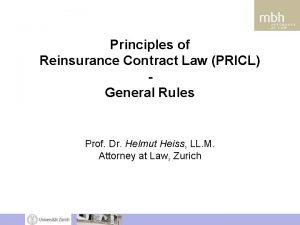Principles of Contract Law Faculty of Law University












- Slides: 12

Principles of Contract Law Faculty of Law University of Indonesia International Class Program Depok, 18 February 2015 Faculty of Law. Universitas Indonesia

Today’s Roadmap • Definitions and General Terms • Sources of Obligations • The difference between Agreements and Obligations • Validity of an Agreement • Breach of Contract and Force Majeure • Types of Obligations and Agreements • Termination of an Agreement Faculty of Law-Universitas Indonesia

Definitions and General Terms • Obligations (Perikatan) “a legal relationship (pertaining to goods or wealth) between two people/parties, which gives rights to one of the parties to claim certain goods from the other, a claim that must be fulfilled by the other party” • Some general terms: • Creditor • Debtor • Performance (prestasi) [1234 Civil Code] • How many are there? Faculty of Law-Universitas Indonesia

Sources of Obligations • From the Law (1352 -1380 Civil Code) • Purely from what the law says • Obligations stemming from familial relationships • See Book I of the Civil Code • From actions that a person committed: • Something that is permitted • Something that is against the law (onrechtmatige daad) • Article 1365 Civil Code • From a valid Agreement • What makes an Agreement valid? • Obligation has a wider understanding and a more ‘abstract’ concept than agreement. • If you see from the above sources, obligations (or the legal relationship that it entails) can be borne from not just an agreement Faculty of Law-Universitas Indonesia

What Makes a Valid Agreement? • Legal Capacity of the Parties A definite object • Contractual age • You can determine the object • No guardianship • You can trade the object • Authorized • • • Contract must not contravene: Consent by free will to make the contract • The law • No duress • Public Norms • Morals/Decency • No misrepresentation/fraud • No mistake Faculty of Law. Universitas Indonesia

What Makes a Valid Agreement? • Validity of an agreement: Articles 1320 to 1337 Civil Code • Two classifications of the requirements: • Subjective requirements • Objective requirements • What are the consequences of failure to fulfill the requirements? Faculty of Law-Universitas Indonesia

Performance Issues Faculty of Law-Universitas Indonesia

Performance Issues • Breach of Contract/Default (Wanprestasi) • Debtor fails to perform under the contract • Entitled to Remedies: • Specific Performance • Damages • Transfer of Risk • Damages [1244, 1245, 1246 Civil Code]: • Expenses • Losses • Interest • Notification of Breach/Default is important (Ingebreke Stelling – Somasi) [1243, 1238 Civil Code] • Duty to pay damages starts from this Notification • For fixed-term Obligations, no Notification is required Faculty of Law-Universitas Indonesia

Performance Issues: That’s Okay, You’re Probably Tired • Breach of Contract/Default is excused when there is a Force Majeure or Overmacht [1244, 1245, 1444 Civil Code] • 3 elements for a valid Force Majeure claim: • A performance that is not fulfilled • The cause of the non-performance is beyond the debtor’s actions/mistake • The cause was not foreseeable and cannot be placed on the debtor. • Consequences of a Force Majeure: • Creditor cannot claim for specific performance • Creditor cannot establish that the debtor breached • The agreement cannot be severed, the obligation between them will only disappear temporarily. Faculty of Law-Universitas Indonesia

Types of Obligations and Agreements • 1. Obligations: Conditional Obligation (Perikatan bersyarat) (Articles 1253 -1267 of the Civil Code); 2. Fixed-term Obligation (Perikatan dengan ketetapan waktu) (Articles 1268 -1271 of the Civil Code); 3. Voluntary Obligation (Perikatan mana suka) (Articles 1272 -1277 of the Civil Code); 4. Joint/Solidary Obligation (Perikatan tanggung menanggung) (Articles 1278 -1295 of the Civil Code); 5. Divisible and Indivisible Obligation (Articles 1296 -1303 of the Civil Code); 6. Obligation with a possibility to impose Punishment when not fulfilled (Articles 1312 -1340 of the Civil Code). • 1. 2. 3. 4. 5. 6. 7. 8. 9. Agreements: Sales/Purchase Agreement (Perjanjian jual beli); Lease Agreement (Perjanjian sewa menyewa); Donation/Gift Agreement (Perjanjian hibah); Partnership/Association Agreement (Perjanjian persekutuan); Assignment Agreement(Perjanjian penyuruhan); Loan Agreement (Perjanjian pinjam meminjam); Credit Agreement (Penanggungan hutang); Employment Agreement (Perjanjian kerja); and Settlement Agreement (Perjanjian perdamaian). Faculty of Law-Universitas Indonesia

Termination of Agreement Article 1381 of the Civil Code on Termination of Agreement: 1. Payment (Articles 1382 -1403); 2. Offer of to pay in cash, followed by act of depositing (Articles 1404 -1412); 3. Novation (pembaharuan hutang) (Articles 1413 -1424); 4. Debt Setoff (perjumpaan hutang) (Articles 1425 -1435); 5. Debt mixture (percampuran hutang) (Articles 1436 -1437); 6. Debt Write off (penghapusan utang) (Articles 1438 -1443); 7. Destruction of the object of debt/obligation (Articles 1444 -1445); 8. Termination or cancellation (Articles 1446 -1456); 9. A termination condition of a conditional obligation (Articles 1253, 1265 -1267); 10. Expiration (Articles 1946 -1962, Articles 1967 -1993). Faculty of Law-Universitas Indonesia

Principles of Contract Law Faculty of Law University of Indonesia International Class Program Depok, 18 February 2015 Faculty of Law-Universitas Indonesia
 Faculty of law of the university of zagreb
Faculty of law of the university of zagreb University of montenegro faculty of law
University of montenegro faculty of law Principles of reinsurance contract law
Principles of reinsurance contract law Ifrs 15
Ifrs 15 Contingent contract and wagering agreement
Contingent contract and wagering agreement Herszon kherson maritime college of merchant marine fleet
Herszon kherson maritime college of merchant marine fleet Bridgeport engineering department
Bridgeport engineering department Computer science tutor bridgeport
Computer science tutor bridgeport Hubert kairuki memorial university faculty of medicine
Hubert kairuki memorial university faculty of medicine Solid thyroid nodule
Solid thyroid nodule Applied medical sciences
Applied medical sciences Fsu computer science department
Fsu computer science department Faculty of business and economics mendel university in brno
Faculty of business and economics mendel university in brno























